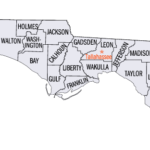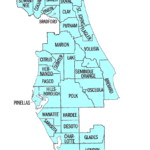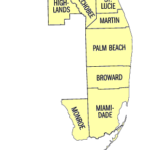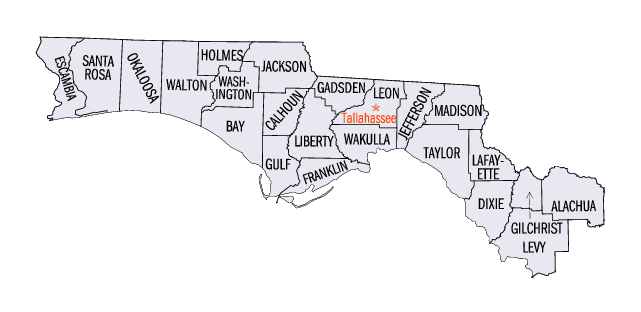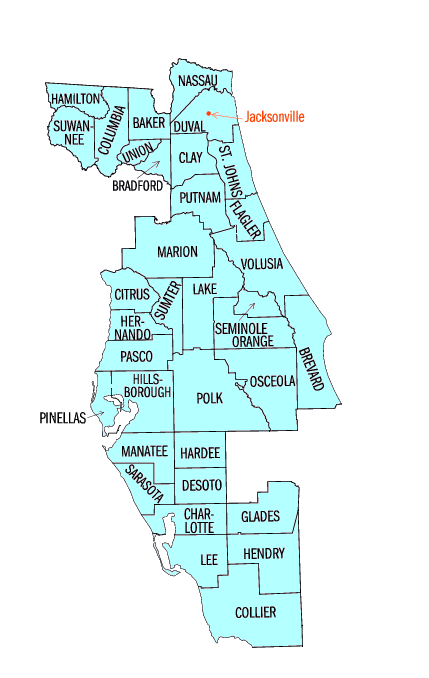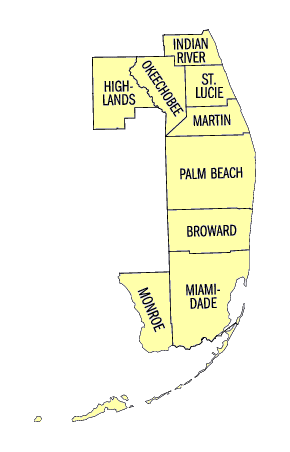Florida Federal Districts:
Northern, Middle, and Southern
Below you will find information on standard conditions of supervision and travel restrictions, as well as sex offender registry requirements.
Always follow the conditions and restrictions given to you by your U.S. Probation Officer.
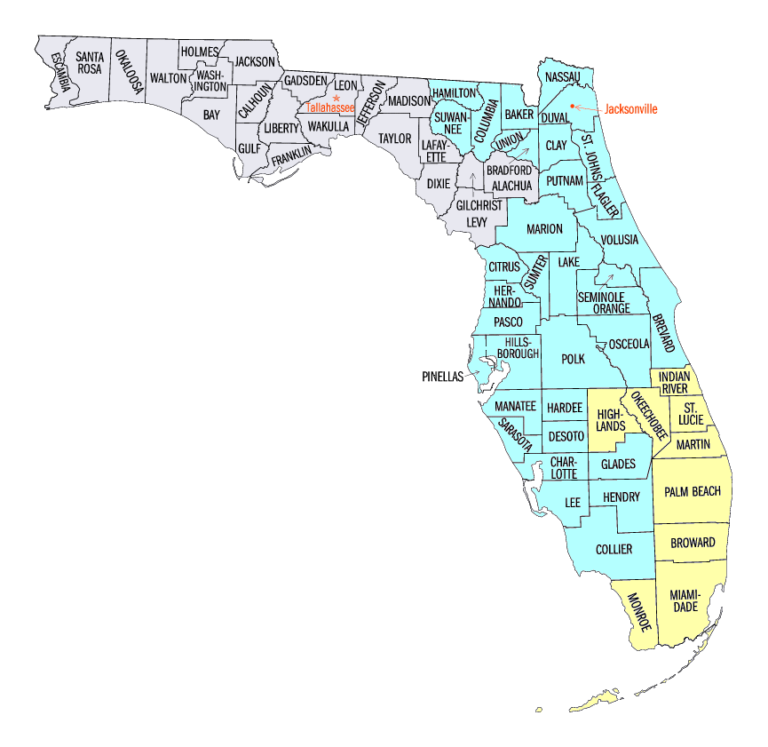
Select your district below:
Standard Conditions of Supervision
As part of your supervised release, you must comply with the following standard conditions of supervision. These conditions are imposed because they establish the basic expectations for your behavior while on supervision and identify the minimum tools needed by probation officers to keep informed, report to the court about, and bring about improvements in your conduct and condition.
- You must report to the probation office in the federal judicial district where you are authorized to reside within 72 hours of your release from imprisonment, unless the probation officer instructs you to report to a different probation office or within a different time frame.
- After initially reporting to the probation office, you will receive instructions from the court or the probation officer about how and when you must report to the probation officer, and you must report to the probation officer as instructed.
- You must not knowingly leave the federal judicial district where you are authorized to reside without first getting permission from the court or the probation officer.
- You must answer truthfully the questions asked by your probation officer.
- You must live at a place approved by the probation officer. If you plan to change where you live or anything about your living arrangements (such as the people you live with), you must notify the probation officer at least 10 days before the change. If notifying the probation officer in advance is not possible due to unanticipated circumstances, you must notify the probation officer within 72 hours of becoming aware of a change or expected change.
- You must allow the probation officer to visit you at any time at your home or elsewhere, and you must permit the probation officer to take any items prohibited by the conditions of your supervision that he or she observes in plain view.
- You must work full time (at least 30 hours per week) at a lawful type of employment, unless the probation officer excuses you from doing so. If you do not have full-time employment you must try to find full-time employment, unless the probation officer excuses you from doing so. If you plan to change where you work or anything about your work (such as your position or your job responsibilities), you must notify the probation officer at least 10 days before the change. If notifying the probation officer at least 10 days in advance is not possible due to unanticipated circumstances, you must notify the probation officer within 72 hours of becoming aware of a change or expected change.
- You must not communicate or interact with someone you know is engaged in criminal activity. If you know someone has been convicted of a felony, you must not knowingly communicate or interact with that person without first getting the permission of the probation officer.
- If you are arrested or questioned by a law enforcement officer, you must notify the probation officer within 72 hours.
- You must not own, possess, or have access to a firearm, ammunition, destructive device, or dangerous weapon (i.e., anything that was designed, or was modified for, the specific purpose of causing bodily injury or death to another person such as nunchakus or tasers).
- You must not act or make any agreement with a law enforcement agency to act as a confidential human source or informant without first getting the permission of the court.
- If the probation officer determines that you pose a risk to another person (including an organization), the probation officer may require you to notify the person about the risk and you must comply with that instruction. The probation officer may contact the person and confirm that you have notified the person about the risk.
- You must follow the instructions of the probation officer related to the conditions of supervision.
Travel Restrictions
The Northern District of Florida is comprised of 23 counties. You are allowed to travel freely within these 23 counties. Unless you are given permission in advance by the judge in your case, any requests to travel outside of these 23 counites must be approved in advance by your U.S. Probation Officer.
Failure to do so may result in a violation of your supervision.
For more information visit the links below:
Mandatory Conditions of Supervision
- You must not commit another federal, state or local crime.
- You must not unlawfully possess a controlled substance.
- You must refrain from any unlawful use of a controlled substance. You must submit to one drug test within 15
days of release from imprisonment and at least two periodic drug tests thereafter, as determined by the court. - Defendant shall cooperate in the collection of DNA, as directed by the probation officer.
Standard Conditions of Supervision
As part of Defendant’s supervised release, Defendant must comply with the following standard conditions of supervision. These conditions are imposed because they establish the basic expectations for Defendant’s behavior while on supervision and identify the minimum tools needed by probation officers to keep informed, report to the court about, and bring about improvements in Defendant’s conduct and condition.
- Defendant must report to the probation office in the federal judicial district where Defendant is authorized to reside within 72 hours of Defendant’s release from imprisonment, unless the probation officer instructs Defendant to report to a different probation office or within a different time frame.
- After initially reporting to the probation office, Defendant will receive instructions from the court or the probation officer about how and when Defendant must report to the probation officer, and Defendant must report to the probation officer as instructed.
- Defendant must not knowingly leave the federal judicial district where Defendant is authorized to reside without first getting permission from the court or the probation officer.
- Defendant must answer truthfully the questions asked by Defendant’s probation officer
- Defendant must live at a place approved by the probation officer. If Defendant plans to change where Defendant lives or anything about Defendant’s living arrangements (such as the people Defendant lives with), Defendant must notify the probation officer at least 10 days before the change. If notifying the probation officer in advance is not possible due to unanticipated circumstances, Defendant must notify the probation officer within 72 hours of becoming aware of a change or expected change.
- Defendant must allow the probation officer to visit Defendant at any time at Defendant’s home or elsewhere, and Defendant must permit the probation officer to take any items prohibited by the conditions of Defendant’s supervision that the probation officer observes in plain view.
- Defendant must work full time (at least 30 hours per week) at a lawful type of employment, unless the probation officer excuses Defendant from doing so. If Defendant does not have full-time employment Defendant must try to find full-time employment, unless the probation officer excuses Defendant from doing so. If Defendant plans to change where Defendant works or anything about Defendant’s work (such as Defendant’s position or Defendant’s job responsibilities), Defendant must notify the probation officer at least 10 days before the change. If notifying the probation officer at least 10 days in advance is not possible due to unanticipated circumstances, Defendant must notify the probation officer within 72 hours of becoming aware of a change or expected change.
- Defendant must not communicate or interact with anyone Defendant knows is engaged in criminal activity. If Defendant knows someone has been convicted of a felony, Defendant must not knowingly communicate or interact with that person without first getting the permission of the probation officer.
- If Defendant is arrested or questioned by a law enforcement officer, Defendant must notify the probation officer within 72 hours.
- Defendant must not own, possess, or have access to a firearm, ammunition, destructive device, or dangerous weapon (i.e., anything that was designed, or was modified for, the specific purpose of causing bodily injury or death to another person, such as nunchakus or tasers).
- Defendant must not act or make any agreement with a law enforcement agency to act as a confidential human source or informant without first getting the permission of the court.
- If the probation officer determines that Defendant poses a risk to another person (including an organization), the probation officer may require Defendant to notify the person about the risk and Defendant must comply with that instruction. The probation officer may contact the person and confirm that Defendant has notified the person about the risk.
- Defendant must follow the instructions of the probation officer related to the conditions of supervision.
Travel Restrictions
The Middle District of Florida is comprised of 35 counties. Unless otherwise instructed by their Probation Officer, offenders may travel within the Middle District of Florida without special permission.
Unless you are given permission in advance by the judge in your case, any requests to travel outside of these 35 counties must be approved in advance by your U.S. Probation Officer.
Failure to obtain approval may result in a violation of your supervision.
Requests for travel within the United States should be made at least two weeks in advance; requests for travel outside the United States must be made at least one month in advance and will generally be for hardship reasons only.
No pleasure travel will be allowed during the first 60 days of supervision. Travel requests may be denied if any monetary obligations are delinquent.
For more information visit the links below:
Standard Conditions of Supervision
- You shall not commit another federal, state, or local crime during the term of supervision.
- You shall not leave the judicial district or other specified geographic area without the permission of the Court or the probation officer.
- You shall report to the probation officer as directed by the Court or probation officer, and shall submit a truthful and complete written report within the first five days of each month.
- You shall answer truthfully, all inquiries by the probation officer and shall follow the instructions of the probation officer.
- You shall support your legal dependents and meet other family responsibilities.
- You shall work regularly at a lawful occupation unless excused by the probation officer for schooling, training, or other acceptable reasons.
- You shall notify the probation officer at least ten (10) days prior to any change in residence or employment.
- You shall refrain from excessive use of alcohol, and shall not purchase, possess, use, distribute, or administer any narcotic or controlled substance, or any paraphernalia related to such substances, except as prescribed by a physician.
- You shall not frequent places where controlled substances are illegally sold, used, distributed or administered or other places specified by the Court.
- You shall not associate with any person engaged in criminal activity and shall not associate with any person convicted of a felony unless granted permission to do so by the probation officer.
- You shall permit a probation officer to contact you at any time, at home or elsewhere, and shall permit confiscation of any contraband observed in plain view by the probation officer.
- You shall notify the probation officer within 72 hours of an arrest or questioning by a law enforcement officer.
- You shall not enter into any agreement to act as an informer or special agent of a law enforcement agency without the permission of the United States District Court.
- As directed by the probation officer, you shall notify third parties of risk that may be occasioned by your criminal record or personal history or characteristics, and shall permit the probation officer to make such notification and to confirm your compliance with such notification requirement.
Travel Restrictions
You shall not leave the judicial district without permission of the Probation Officer and/or the Court.
Advance approval from the Court must be requested for international travel (which includes travel beyond the three nautical mile limits) and vacation travel outside the district for more than 30 days. For international travel, offenders must make their request no less than six (6) weeks in advance. Please note, there are additional steps required when traveling to foreign countries such as permission from that country etc. For domestic travel, offenders must make their request at least two (2) weeks in advance. Please note, there may be some limitations placed by other states as to travel. (Check with your probation officer on state limitations) Offenders may not leave the Southern District of Florida without permission of the Court and/or probation officer. Any travel outside the district requires advance written permission. No travel will be allowed during the initial assessment period of 60 days, except for a verifiable emergency situation. Additionally, travel may not be granted to offenders who are not in compliance with the conditions of supervision.
For more information visit the links below:
What is the sex offender registry?
What is the Sex Offender Registry?
Every state and U.S. territory requires those convicted of sex offenses to be added to a registry to be monitored and tracked after their release back into the community. Information about the offender is collected and shared with local and federal authorities, as well as the general public. Requirements and restrictions are often placed on registered sex offenders. That registration process is unique in each state and U.S. territory.

What is SORNA?
The Sex Offender Registration and Notification Act (SORNA) was passed in 2006 as part of the Adam Walsh Child Protection and Safety Act to provide federal standards for jurisdictions to follow. SORNA calls for states and U.S. territories to meet minimum requirements for sex offender registration and notification.
Why Are the Requirements for Sex Offender Registration Different Everywhere?
While SORNA’s guidelines streamlined registration and notification requirements across the country, these requirements are far from uniform. Each jurisdiction determines the details of their own registration process. This leaves a patchwork of rules for sex offenders that vary widely depending on where a registrant lives or works.
Where PIN Comes In
Probation Information Network developed a list of questions regarding the sex offender registration requirements across the country. These are questions that might concern the public, victims and their advocates, or those who are facing registration or are currently registered and their loved ones. We then searched the statutes or code of each jurisdiction for the laws surrounding sex offender registration and notification. Where necessary, we consulted with the law enforcement agency in charge of the jurisdiction’s registry to provide clear and concise answers to the following questions:
- What is the duration of registration?
How long must a sex offender remain on the registry? The length of time a sex offender must comply with registration requirements varies widely depending on the jurisdiction where the registrant lives, and the level of the offense committed. All but 2 jurisdictions offer a path for eventual removal from the registry for at least some of their registrants.
- Must the immediate community be notified directly, either by the offender or law enforcement?
Every jurisdiction has passive community notification in the form of a public sex offender registry website. Concerned citizens are free to search the website and can sign up for email notifications if a sex offender moves into their neighborhood. Some jurisdictions go even further and require active notification, where either law enforcement or the offender themselves is required to directly notify the immediate community that a sex offender is in the area. This can take many forms, including electronic, mail, or in-person notification, publication in local newspapers, and community meetings.
- What are the residence distance restrictions?
Are there any restrictions on where a registered sex offender can live? Some jurisdictions restrict registrants from living within a measured distance of certain places. This restriction could be for all registrants, or only for higher-level offenders or those under supervision. Some jurisdictions do not have a state-wide restriction but do allow local jurisdictions to enact their own.
- What are the employment distance restrictions?
Registered sex offenders are usually restricted from certain types of employment, and from working at establishments that specifically cater to minors. Some jurisdictions go even further and restrict registrants from working within a measured distance of certain places.
- Is an employer’s information included on the public registry?
Returning citizens of every type need to find employment upon reentry, and sex offenders are no exception. Some jurisdictions include registrants’ employment information on the public registry website. This could be the employer’s address or in some cases the name of the employer.
- Are online identifiers included on the public registry?
Some jurisdictions require registered sex offenders to report any identifiers they use online, such as email addresses and social media user names. In some jurisdictions that information is included on the public registry website, separate from the registrant’s profile, in a feature that allows the public to search by specific identifiers.
- Is a state-issued ID required to be labeled?
Some jurisdictions require a state-issued ID, such as a driver’s license, to be labeled to identify the holder as a registered sex offender. This label could be the words “Sex Offender” printed on the ID in a prominent place or a more subtle designation known to law enforcement.
- What is the cost of registration?
Is there a fee to register as a sex offender? Some jurisdictions pass on some of their administrative costs to the registrants. This could be a one-time fee paid only upon initial registration, or an ongoing fee paid annually or quarterly. Some jurisdictions charge a fee every time a registrant updates their information.
- How long can a registrant be in the state for work or education before registration is required?
Does a sex offender have to register if they work or go to school in a different state? It depends on the state, and how long the registrant will be there. Some jurisdictions require registrants to notify authorities immediately, while others allow limited stays without requiring registration. Registrants currently under supervision usually need permission from their Parole or Probation Officer before traveling and should always consult their supervising officer.
- How long can a registrant visit the state before registration is required?
Can a registered sex offender go on vacation? Does a sex offender have to register if they visit a different state? It depends on the state, and how long the registrant will be there. Some jurisdictions require registrants to notify authorities immediately, while others allow limited stays without requiring registration. Registrants currently under supervision usually need permission from their Parole or Probation Officer before traveling and should always consult their supervising officer.
The answers provided are taken directly from the laws found on the state or territory’s legislative website or, where necessary, from the website of the law enforcement agency in charge of the jurisdiction’s registry. In some cases, we contacted state or territory officials for clarification and have directly quoted those conversations.
Disclaimer
While we stand by our research, it is for informational purposes only. It should not be considered legal advice and, while we strive to provide accurate and up to date information, it is not guaranteed to be complete or correct. We provide links to each jurisdiction’s legislative and law enforcement websites and maintain a directory of lawyers who specialize in sex offender registration laws. For those currently under supervision, consult with your Parole or Probation Officer for guidance.
What is the duration of registration?
FL Stat § 943.0435
(11) Except as provided in s. 943.04354, a sexual offender shall maintain registration with the department for the duration of his or her life unless the sexual offender has received a full pardon or has had a conviction set aside in a postconviction proceeding for any offense that meets the criteria for classifying the person as a sexual offender for purposes of registration. However, a sexual offender shall be considered for removal of the requirement to register as a sexual offender only if the person:
(a)1. Has been lawfully released from confinement, supervision, or sanction, whichever is later, for at least 25 years and has not been arrested for any felony or misdemeanor offense since release, provided that the sexual offender’s requirement to register was not based upon an adult conviction:
a. For a violation of s. 787.01 or s. 787.02;
b. For a violation of s. 794.011, excluding s. 794.011(10);
c. For a violation of s. 800.04(4)(a)2. where the court finds the offense involved a victim under 12 years of age or sexual activity by the use of force or coercion;
d. For a violation of s. 800.04(5)(b);
e. For a violation of s. 800.04(5)(c)2. where the court finds the offense involved the use of force or coercion and unclothed genitals or genital area;
f. For a violation of s. 825.1025(2)(a);
g. For any attempt or conspiracy to commit any such offense;
h. For a violation of similar law of another jurisdiction; or
i. For a violation of a similar offense committed in this state which has been redesignated from a former statute number to one of those listed in this subparagraph.
Must the immediate community be notified directly, either by the offender or law enforcement?
FL Stat § 775.21
(7) (a) Law enforcement agencies must inform members of the community and the public of a sexual predator’s presence. Upon notification of the presence of a sexual predator, the sheriff of the county or the chief of police of the municipality where the sexual predator establishes or maintains a permanent or temporary residence shall notify members of the community and the public of the presence of the sexual predator in a manner deemed appropriate by the sheriff or the chief of police. Within 48 hours after receiving notification of the presence of a sexual predator, the sheriff of the county or the chief of police of the municipality where the sexual predator temporarily or permanently resides shall notify each licensed child care facility, elementary school, middle school, and high school within a 1-mile radius of the temporary or permanent residence of the sexual predator of the presence of the sexual predator. Information provided to members of the community and the public regarding a sexual predator must include:
- The name of the sexual predator;
- A description of the sexual predator, including a photograph;
- The sexual predator’s current permanent, temporary, and transient addresses, and descriptions of registered locations that have no specific street address, including the name of the county or municipality if known;
- The circumstances of the sexual predator’s offense or offenses; and
- Whether the victim of the sexual predator’s offense or offenses was, at the time of the offense, a minor or an adult.
This paragraph does not authorize the release of the name of any victim of the sexual predator.
What are the residence distance restrictions?
FL Stat § 775.215
(2)(a) A person who has been convicted of a violation of s. 794.011, s. 800.04, s. 827.071, s. 847.0135(5), or s. 847.0145, regardless of whether adjudication has been withheld, in which the victim of the offense was less than 16 years of age, may not reside within 1,000 feet of any school, child care facility, park, or playground. However, a person does not violate this subsection and may not be forced to relocate if he or she is living in a residence that meets the requirements of this subsection and a school, child care facility, park, or playground is subsequently established within 1,000 feet of his or her residence.
(c) This subsection applies to any person convicted of a violation of s. 794.011, s. 800.04, s. 827.071, s. 847.0135(5), or s. 847.0145 for offenses that occur on or after October 1, 2004, excluding persons who have been removed from the requirement to register as a sexual offender or sexual predator pursuant to s. 943.04354.
(3)(a) A person who has been convicted of an offense in another jurisdiction that is similar to a violation of s. 794.011, s. 800.04, s. 827.071, s. 847.0135(5), or s. 847.0145, regardless of whether adjudication has been withheld, in which the victim of the offense was less than 16 years of age, may not reside within 1,000 feet of any school, child care facility, park, or playground. However, a person does not violate this subsection and may not be forced to relocate if he or she is living in a residence that meets the requirements of this subsection and a school, child care facility, park, or playground is subsequently established within 1,000 feet of his or her residence.
(c) This subsection applies to any person convicted of an offense in another jurisdiction that is similar to a violation of s. 794.011, s. 800.04, s. 827.071, s. 847.0135(5), or s. 847.0145 if such offense occurred on or after May 26, 2010, excluding persons who have been removed from the requirement to register as a sexual offender or sexual predator pursuant to s. 943.04354.
What are the employment distance restrictions?
FL Stat § 775.21
(10)(b) A sexual predator who has been convicted of or found to have committed, or has pled nolo contendere or guilty to, regardless of adjudication, any violation, or attempted violation, of s. 787.01, s. 787.02, or s. 787.025(2)(c), where the victim is a minor; s. 794.011, excluding s. 794.011(10); s. 794.05; former s. 796.03; former s. 796.035; s. 800.04; s. 827.071; s. 847.0133; s. 847.0135(5); s. 847.0145; or s. 985.701(1); or a violation of a similar law of another jurisdiction when the victim of the offense was a minor, and who works, whether for compensation or as a volunteer, at any business, school, child care facility, park, playground, or other place where children regularly congregate, commits a felony of the third degree, punishable as provided in s. 775.082, s. 775.083, or s. 775.084.
Is an employer's information included on the public registry?
No.
Are online identifiers included on the public registry?
Offenders must register email addresses and internet identifiers. While this information is not included on an offender’s registry profile, there is a separate search feature that allows the public to search by specific email addresses or internet identifiers.
FL Stat § 943.0435
(4)(e)1. A sexual offender shall register all electronic mail addresses and Internet identifiers, and each Internet identifier’s corresponding website homepage or application software name, with the department through the department’s online system or in person at the sheriff’s office within 48 hours after using such electronic mail addresses and Internet identifiers. If the sexual offender is in the custody or control, or under the supervision, of the Department of Corrections, he or she must report all electronic mail addresses and Internet identifiers, and each Internet identifier’s corresponding website homepage or application software name, to the Department of Corrections before using such electronic mail addresses or Internet identifiers. If the sexual offender is in the custody or control, or under the supervision, of the Department of Juvenile Justice, he or she must report all electronic mail addresses and Internet identifiers, and each Internet identifier’s corresponding website homepage or application software name, to the Department of Juvenile Justice before using such electronic mail addresses or Internet identifiers.
Is a state-issued ID required to be labeled?
Yes.
FL Stat § 322.141
(3) All licenses for the operation of motor vehicles or identification cards originally issued or reissued by the department to persons who are designated as sexual predators under s. 775.21 or subject to registration as sexual offenders under s. 943.0435 or s. 944.607, or who have a similar designation or are subject to a similar registration under the laws of another jurisdiction, shall have on the front of the license or identification card the following:
(a) For a person designated as a sexual predator under s. 775.21 or who has a similar designation under the laws of another jurisdiction, the marking “SEXUAL PREDATOR.”
(b) For a person subject to registration as a sexual offender under s. 943.0435 or s. 944.607, or subject to a similar registration under the laws of another jurisdiction, the marking “943.0435, F.S.”
What is the cost of registration?
There is no state-mandated fee, though fees may be assessed by local law enforcement.
How long can a registrant be in the state for work or education before registration is required?
FL Stat § 775.21
(2)(k) “Permanent residence” means a place where the person abides, lodges, or resides for 3 or more consecutive days.
(n) “Temporary residence” means a place where the person abides, lodges, or resides, including, but not limited to, vacation, business, or personal travel destinations in or out of this state, for a period of 3 or more days in the aggregate during any calendar year and which is not the person’s permanent address or, for a person whose permanent residence is not in this state, a place where the person is employed, practices a vocation, or is enrolled as a student for any period of time in this state.
How long can a registrant visit the state before registration is required?
FL Stat § 775.21
(2)(n) “Temporary residence” means a place where the person abides, lodges, or resides, including, but not limited to, vacation, business, or personal travel destinations in or out of this state, for a period of 3 or more days in the aggregate during any calendar year and which is not the person’s permanent address or, for a person whose permanent residence is not in this state, a place where the person is employed, practices a vocation, or is enrolled as a student for any period of time in this state.
